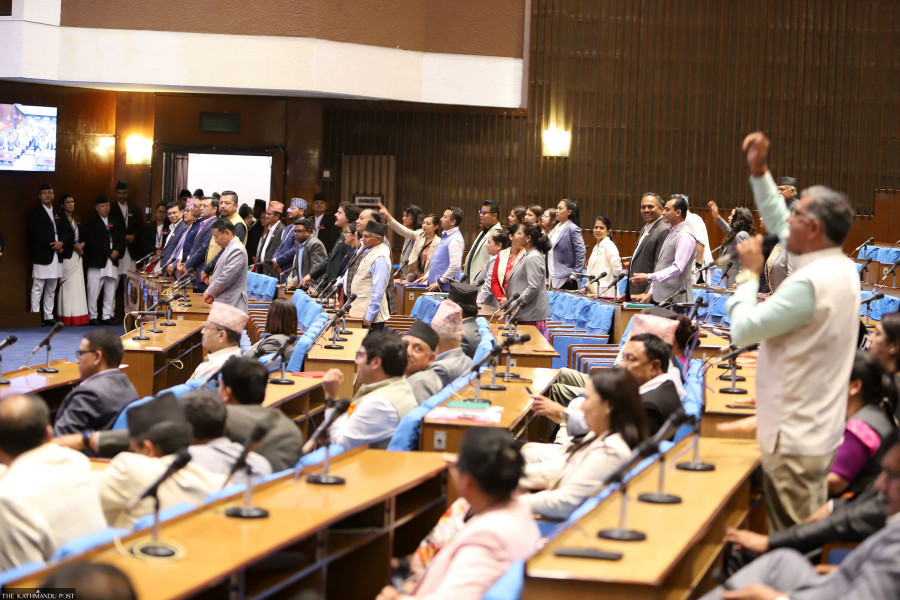Politics
No deal yet on House deadlock as parties push rival proposals
Maoist Centre’s proposal gaining traction among ruling bloc. Opposition meet inconclusive, but backs RSP’s proposal.
Anil Giri
The House of Representatives remains stalled for over two weeks now as major parties fail to reach consensus on how to investigate the visit visa scam and whether Home Minister Ramesh Lekhak should resign.
After the Commission for the Investigation of Abuse of Authority (CIAA) unearthed the visit visa scam at the Tribhuvan International Airport immigration office and possible links between the immigration officials and senior officials at the Home Ministry, opposition parties have upped the ante against Home Minister Ramesh Lekhak over the past two weeks. The opposition has been continuously obstructing Parliament, demanding an investigation into Lekhak, who is allegedly linked to the visa scam.
On Wednesday also, attempts to resume House proceedings stalled after ruling and opposition parties failed to strike a deal, according to party leaders.
The CPN (Maoist Centre) prepared a two-point draft in order to help end the standoff and circulated it to the ruling and opposition parties for their consideration. CPN-UML Secretary Yogesh Bhattarai ruled out discussing a five-point proposal forwarded by the Rastriya Swatantra Party, but said the two-point proposal forwarded by the Maoist Centre could be discussed.
Speaking to journalists outside the Parliament building, he stated that if the obstruction continues until tomorrow (Thursday), Parliament will proceed as per its regulations.
He said, “The RSP disagrees with the two-point agreement we reached with the Maoists. The five-point proposal sent by the RSP is not up for discussion. We cannot go into that. We agree with the draft proposal sent by the Maoists.”
With this, the Nepali Congress, CPN-UML, CPN (Maoist Centre) and the CPN (Unified Socialist) have formed a common front, while the RSP and the Rastriya Prajatantra Party stand on the opposite side of the big parties.
“With the support of the Maoist Centre and the Unified Socialist, we, along with the UML, are going to resume the House session tomorrow [Thursday],” a Nepali Congress leader told the Post.
Of late, the Maoist Centre has changed its position and stated that once the government commits to addressing the visit visa scam, the stalled House session can be resumed.
Another ruling party Nepali Congress has not made its position public but remains firm in opposing the home minister’s resignation. But the party is open to forming a parliamentary probe committee to look into visit visa anomalies starting from 2006. The Congress party is against a targeted probe against Home Minister Lekhak.
Bhattarai said that since the opposition has asked for more time for discussion, the next session has been scheduled for Thursday.
He added that there is a precedent for Parliament functioning even amid opposition protests, and that it would now depend on the Speaker.
Bhattarai claimed that Maoist leaders also disagree with the five-point proposal of the RSP. After both the Nepali Congress and CPN-UML rejected RSP’s five-point proposal, the Maoist Centre prepared a two-point draft agreement aimed at ending the House deadlock.
Bhattarai said that the Maoists brought forward the two-point draft for discussion as a basis for consensus and his party agrees with the draft. Meanwhile, opposition parties also held a separate meeting but could not produce any reliable outcome. The meeting, held on Wednesday also decided to support the RSP’s five-point proposal.
CPN (Maoist Centre) Deputy General Secretary Barshaman Pun accused the government of not showing enough interest in making Parliament functional. Talking to journalists on the Parliament premises, he said the government should take responsibility for running the House.
“We allowed the budget to be presented. Now discussions on the budget should be taking place, but this visit visa case has become a public issue. Either the government should say that the opposition's concerns are baseless, or if they are valid, they must be ready to act accordingly,” Pun said.
Pun expressed confidence that the ruling parties have a positive attitude toward their demands. But the government is resolutely against the resignation of Lekhak.
Meanwhile, Minister for Communication and Information Technology, Prithvi Subba Gurung, has stated that the opposition's demand for the home minister’s resignation—based on an investigation by the anti-corruption body (CIAA) into government employees—is inappropriate.
While responding to journalists’ questions after announcing the Cabinet’s decisions, Gurung said discussions are ongoing about reopening Parliament. He reiterated that Home Minister Lekhak will not resign.
He also mentioned that talks are underway between the ruling and opposition parties regarding whether or how to form a parliamentary investigation committee. Gurung said, “Ministers will present their views in Parliament on all the issues raised, convey the government's position, and the opposition should support by allowing the House to function and help proceed with the budget-related discussions. We’re working on this, and hopefully, things will be resolved today or tomorrow.
With no breakthrough on Wednesday, the meeting of the House of Representatives has been postponed until Thursday due to the continuous chanting and protests by opposition parties. Speaker Devraj Ghimire informed that all scheduled agendas for Wednesday were removed, and the meeting has been rescheduled for 3 pm on Thursday.
As soon as Wednesday's session began, opposition lawmakers continuously chanted slogans such as “Home Minister must resign” and “Punish the human traffickers.”
Speaker Ghimire had repeatedly urged the opposition to create an environment conducive for discussion, asking parties to express their views along political lines. However, the opposition rejected his appeals.
The opposition parties have been obstructing the House sesion since May 26. Initially, they demanded the resignation of Home Minister Lekhak and the formation of an investigation committee. But recently, they have escalated their demand, calling for either a judicial or parliamentary committee to be formed.




 10.12°C Kathmandu
10.12°C Kathmandu















